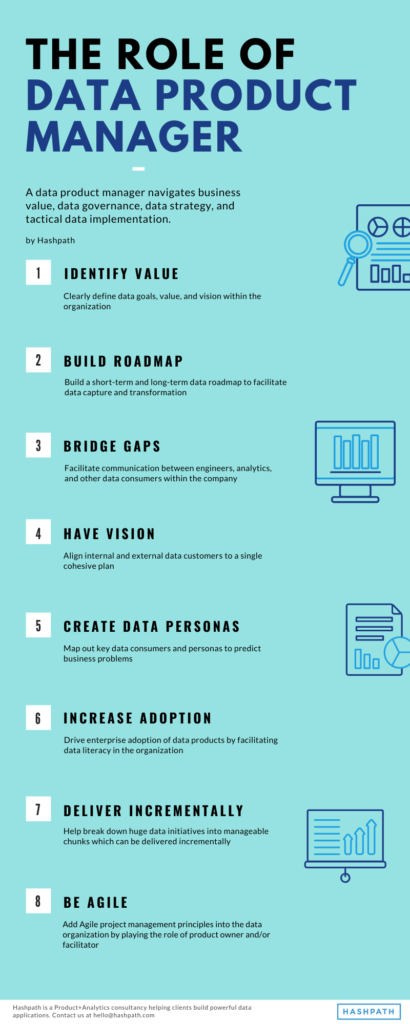If your organization doesn’t have a “Data Product Manager”, it might be time to start thinking about hiring one full-time. If you’re not quite ready, hiring a “fractional” data product manager may make sense.
McKinnsey states that organizations should “treat data as a product with real return on investment just like they would a consumer-facing product”. They continue to say that “business leaders often view data as a raw material that supports analytics and decision making. Instead, they should treat data as an internal product to be packaged and distributed to groups across the enterprise, and manage it as such.”
How do I know if my company needs a data product manager?
Without a data product manager, we’ve seen organizations fall into a couple different buckets:
- “Data Wild Wild West”: Different teams invent different mechanisms for accessing and operationalizing data. This creates silos, data chaos, and confusion.
- “Data team as a service”: Data teams are order takers, often reactionary to the squeakiest wheel. This is another cause of data chaos in the organizations especially when ad-hoc queries and jobs are created with little strategic thinking.
- “Overly complex data organization”: An organization whose data “maturity” is so sophisticated that no one can use it, sell it, or understand it (except for the brilliant minds who created it).
- “The new tools organization”: New visualization platforms, warehouses, or data integrators are considered silver bullets, but often never materialize.
If your company falls into any of these categories, it may be time to think about hiring a data product manager.
Is data product management the same thing as traditional product management?
A traditional product manager is responsible for high value problem discovery and solution steerage. They focus on driving value for customers. They recognize that customers don’t necessarily know the solution to their own problems. They work with a cross-functional teams to understand the problem set and build the best possible solution. In many instances product managers institute idea/test/learn cycles to increase likelihood or product success.
Data product managers share these same attributes. In many instances, a data product manager’s customers are internal employees but the overall product mindset is the same.
What does a data product manager do?
Like most product managers, a data PM does not directly manage anyone on the cross-functional team. Instead, they need to be a player’s coach and get everyone moving in unison to solve a shared problem.
A data product manager navigates business value, data governance, data strategy, and tactical data implementation.
Data PMs are facilitators able to easily navigate conversations between engineers, analytics, and executives. They can talk to data “customers” to clearly identify business problems. Stakeholders for a data product are analysts, executives, external customers or partners, and other product teams. Each have varying degrees of technical abilities and consume data from all different types of touch points.
To state the obvious: A data product manager treats an organization’s data like their product. Because of this, a good data product manager fills the gaps. Some organizations need more or less help in the following areas:
- Clearly defining data goals, value, and vision within the organization
- Building a short-term and long-term data roadmap
- Bridging the gap between engineers, analytics, and other data consumers
- Aligning internal and external data customers to a single cohesive plan
- Clearly mapping out key data consumers and personas
- Driving enterprise adoption of data products
- Facilitating data literacy in an organization
- Helping break down huge data initiatives into manageable chunks which can be delivered incrementally
- Adding Agile project management principles into the data organization by also playing the role of product owner and/or facilitator
A data product manager is one of the hardest product jobs of all. Product managers are constantly balancing the needs of different stakeholders and making informed trade-off decisions. Data product managers are no different, and they are critical to data success.
Like any product role, it’s important to set up key metrics to measure success. This could be KPIs like Business Intelligence tool adoption, internal satisfaction scores, or revenue numbers for data monetization initiatives.

What happens if I continue without a data product manager?
Continuing without a Data Product manager usually ensures that the data problems in your organization will remain at the status quo or get worse. For some organizations, this can lead to “data apathy”, meaning data becomes less and less important to employees because it’s either not accessible, not trusted, or not actionable.
Daniel Mintz recently published an article where he wrote that that data products built without data product managers may be “quickly abandoned because they’re too hard for business users to use, or don’t actually meet the intended need. Or worse, they may present authoritative-seeming answers that are just plain wrong because without an analyst constantly sanity-checking the data, bad data may slip through.”
What if my organization is not ready for a full-time Data Product Manager?
Ensuring your company makes the right data decisions is critical for any growing organization, even for those who aren’t ready for a full-time data product manager. Companies who aren’t ready for a full-time PM achieve this by using a “fractional” data product manager.
The concept of a “Fractional Chief Financial Officer” has been commonplace within startups and scaling companies. Companies who use a fractional CFO are not ready for a full-time CFO, but you need their expertise and oversight so that they you don’t make costly decisions. The same concept can be used for a data product manager.
In many cases, an external expert is beneficial because they have seen what works and what doesn’t at other companies. Most importantly, they can be a fresh set of eyes and challenge you where necessary.
You can also fill the gap by appointing an internal fractional data product manager. An internal fractional data product manager will split their time, possibly as a product manager on another team or as a data analyst.
In order to validate the concept of data product manager, first focus on a project which is small and trackable, potentially a revenue generating opportunity. Try to build an easy win that reinforces the value of data, the value of a data product manager, and sets you on a path to go from fractional to full-time data product manager.
It’s time to take control of your data roadmap, strategy, and execution by hiring a data product manager.


